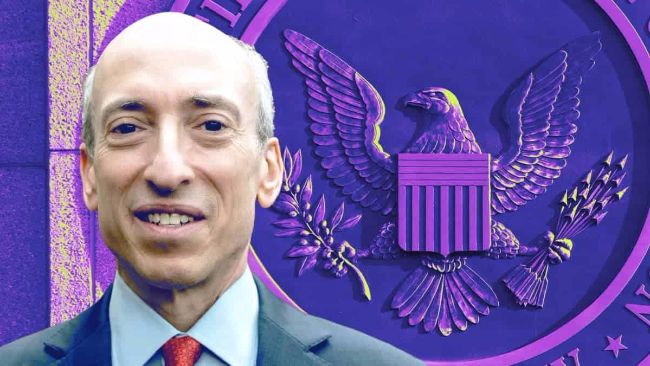Policy & Regulation
Crypto litigation brought against the SEC and the implications of a new administration

Credit : cryptonews.net
January 10, 2025 – As mentioned in our earlier columns, the Securities and Alternate Fee (SEC) has taken quite a few enforcement actions associated to the acquisition and sale of crypto belongings. These circumstances have prolonged to a variety of actions and have generated important uncertainty and criticism from members of the digital asset trade and past.
Now, some states, nonprofits and trade contributors have begun proactively submitting lawsuits in opposition to the SEC, looking for injunctive aid and different aid on a variety of securities-related points. The impression of those fits stays to be seen.
There might also be seismic shifts within the SEC’s enforcement agenda on account of the administration change. Present SEC Chairman Gary Gensler has introduced that he’ll step down on January 20, 2025, and President-elect Trump has since chosen former SEC Commissioner Paul Atkins to steer the company. Atkins is mostly seen as pro-crypto and in a Token Alliance whitepaper launched in 2018 titled “Understanding Digital Tokens: Market Overviews and Proposed Tips for Policymakers and Practitioners”, Atkins criticized the “regulatory uncertainty” created created by the SEC’s declarations and settlements. and enforcement actions in area.
Under is a abstract of some latest lawsuits filed in opposition to the SEC, in addition to a have a look at what the administration change may imply for the SEC’s ongoing strategy.
Lawsuits in opposition to the SEC
Secondary market gross sales of digital belongings. In Kentucky v. SEC, filed in November 2024, 18 states and the DeFi Schooling Fund filed a lawsuit in opposition to the SEC, alleging that its enforcement actions concentrating on the sale of crypto belongings within the secondary market unlawfully infringe state regulatory authorities.
Prosecutors Declare Huge Questions Doctrine ‘Shields'[s] the SEC’s try to radically develop its energy’, as a result of the SEC’s strategy would ‘convey a couple of transformative growth’ [the SEC’s] regulator” and would have a profound and lasting impression on the multi-billion greenback digital asset trade.
The plaintiffs additional allege that the SEC violated the Administrative Process Act (APA) by failing to reveal its “crypto coverage” by means of discover and remark procedures. At its core, the states argue that the SEC’s enforcement place has threatened to thwart fastidiously designed client safety measures carried out by the states, together with state cash transmission regimes, monetary laws, and unclaimed property legal guidelines.
The SEC will possible reply that the massive questions doctrine doesn’t apply as a result of regulating the cryptocurrency trade doesn’t have the large financial and political significance ample to invoke the doctrine. See e.g. Sec. & Execution Comm’n v. Terraform Labs Pte. Ltd., 684 F. Supp. 3d 170, 189 (SDNY 2023)opens a brand new tab.
The SEC can be prone to argue that it has not violated the APA as a result of it isn’t asserting any new coverage on cryptocurrency regulation or regulation by means of enforcement, however merely implementing its beforehand said place that sure crypto belongings could be regulated as securities in the event that they meet the traits of an ‘funding contract’ underneath current legislation. Identification card at *192.
Futures contracts on a digital asset. In Bitnomial Alternate, LLC v. SEC, filed in October 2024, Bitnomial Alternate LLC, a chosen contract market maker authorised by the Commodity Futures Buying and selling Fee (CFTC), challenges the SEC’s place that XRP US Greenback Futures Contracts – futures contracts on digital asset – are safety futures.
Bitnomial claims that XRP will not be a safety within the first place, based mostly totally on Choose Torres’ latest determination in SEC v. Ripple Labs, stating that XRP will not be a safety by itself or when traded in blind trades on secondary platforms.
Extra basically, Bitnomial states that it “could not be capable to adjust to the [Securities Exchange Act of 1934’s] necessities to record of XRP.
NFTs. As now we have finished earlier thanopens a brand new tab famous that in Mann v. SEC, filed in July 2024, Jonathan Mann, a musician, and Brian L. Frye, a legislation professor, filed swimsuit looking for to problem the SEC’s enforcement actions concentrating on non-fungible tokens ( NFTs). The criticism states that NFTs are artwork, and that artwork will not be throughout the SEC’s laws.
Mann and Frye put it bluntly: ‘It will have been ridiculous to require nice American visible artists resembling Lichtenstein, Basquiat, Warhol, O’Keefe, Rockwell, Pollock, Frankenthaler or Wyeth to ‘register’ their work, or to indicated a selected license. exception within the securities legal guidelines simply because they bought a number of copies of their paintings, or created artwork in a variety of associated topics.
The plaintiffs argue that “[t]The applying of securities legal guidelines to artworks not is smart within the digital world.” The plaintiffs search a declaratory judgment that their proposed NFT tasks don’t violate securities legal guidelines.
In a movement to dismiss, the SEC argues that plaintiffs are looking for improper counsel as a result of they don’t allege that the SEC took steps to research or convey enforcement motion in opposition to them. The SEC additionally asserts that sovereign immunity prohibits the motion as a result of enforcement actions are throughout the company’s categorical discretion. The SEC may elevate related defenses, maybe amongst others, in Bitnomial.
Ethereum transactions. In Consensys Software program, Inc. v. SEC, filed in April 2024, charged Consensys Software program Inc. the SEC to stop the company from asserting jurisdiction over Ethereum (ETH) transactions. Consensys presents ‘MetaMask’ pockets software program that permits customers to carry their ETH and different digital belongings on their very own and leverage belongings to be used on third-party exchanges and different decentralized functions.
The SEC workers has issued a Wells Discover to Consensys stating their intent to advocate that the SEC take enforcement motion in opposition to Consensys for violating the federal securities legal guidelines by means of its MetaMask merchandise involving ETH transactions.
Consensys claimed that the SEC issued this Wells Discover although the SEC had declared that ETH will not be a safety and the CFTC had declared that ETH is as an alternative a commodity. The court docket dismissed the criticism totally on the grounds that the SEC workers finally declined to advocate an enforcement motion and advance the claims.
The court docket additionally discovered that Consensys had not recognized a definitive company motion that made its request for declaratory judgment – i.e., an order stopping the SEC from subjecting Consensys to funding or enforcement actions associated to MetaMask – eligible for judicial assessment.
Many of those lawsuits are of their early levels and their impression on enforcement actions and the event of the legislation is unsure. Nevertheless, they mirror a groundswell of dissent – from contributors looking for regulatory readability, states looking for to implement their very own regulatory insurance policies, and nonprofits advocating for creators’ pursuits.
The brand new authorities and a potential shift in enforcement actions
The thrust of every of the lawsuits in opposition to the SEC is that the company has taken a “regulation by enforcement” strategy that has created uncertainty for trade contributors. That’s an opinion shared by two sitting commissioners. For instance, Commissioner Hester Pierce opined in a February 2023 assertion that “[u]Singing enforcement actions to inform individuals what the legislation is in an rising trade” will not be “a good method to regulate.” Commissioner Mark Uyeda has echoed that sentiment, lamenting in a February 2023 assertion that “[f]Or it has been too lengthy for the reason that Fee approached the regulation of crypto belongings by utilizing enforcement actions to introduce new authorized and regulatory theories.”
Which will quickly change with the brand new authorities. President-elect Trump has chosen Paul Atkins to steer the SEC beginning in January 2025. Atkins, an SEC commissioner from 2002 to 2008, is an outspoken proponent of regulatory restraint and a supporter of the crypto-asset trade.
As Atkins defined in an April 20, 2007 speech throughout his tenure as SEC commissioner: “[g]Authorities securities regulators have to be conscious about the regulatory prices they impose in the marketplace.” He promoted “[t]transparency in our regulatory course of by means of public discover and remark.” For that purpose, Atkins said that “[f]or any rulemaking by the fee, such proposed guidelines shall be submitted for public remark underneath the [APA].”
Moreover, Atkins has taken on roles supporting the crypto asset trade. Atkins is a member of the Advisory Board of the Digital Chamber, a non-profit group whose mission on its web site is: ‘promote[ing] the adoption and use of digital belongings and blockchain-based applied sciences.” It has criticized the SEC’s “confrontational strategy” to laws which can be “stifling innovation” and known as for laws to restrict the SEC’s overreach.
Atkins can be the co-chair of the Digital Chamber’s Token Alliance. The Token Alliance is an initiative of greater than 350 blockchain and token specialists in “lively discussions to create pointers for token distributions and token buying and selling platforms.”
Within the foreword to the Token Alliance whitepaper co-authored by Atkins in 2018, he touted the “transformative potentialities of blockchain know-how and the large constructive impression it may have for our economic system.” The Token Alliance whitepaper warns that “[r]regulation by means of enforcement will not be a suitable strategy on this rising surroundings.
Briefly, the brand new administration and President-elect Trump’s alternative of Paul Atkins to steer the SEC alerts a possible change within the company’s crypto-asset enforcement program.
Because the authorized panorama surrounding the providing and sale of digital belongings continues to evolve, these concerned ought to seek the advice of skilled advisors.
Alexander C. Drylewski and Shaud G. Tavakoli are common, joint columnists on Web3 and digital belongings for Reuters Authorized Information and Westlaw At this time.
The opinions expressed are these of the creator. They don’t mirror the views of Reuters Information, which is dedicated to integrity, independence and freedom from bias underneath the Belief Ideas. Westlaw At this time is owned by Thomson Reuters and operates independently of Reuters Information.
-

 Meme Coin6 months ago
Meme Coin6 months agoDOGE Sees Massive User Growth: Active Addresses Up 400%
-

 Blockchain12 months ago
Blockchain12 months agoOrbler Partners with Meta Lion to Accelerate Web3 Growth
-

 Videos12 months ago
Videos12 months agoShocking Truth About TRON! TRX Crypto Review & Price Predictions!
-

 Meme Coin1 year ago
Meme Coin1 year agoCrypto Whale Buys the Dip: Accumulates PEPE and ETH
-

 NFT9 months ago
NFT9 months agoSEND Arcade launches NFT entry pass for Squad Game Season 2, inspired by Squid Game
-

 Solana3 months ago
Solana3 months agoSolana Price to Target $200 Amid Bullish Momentum and Staking ETF News?
-

 Ethereum1 year ago
Ethereum1 year ago5 signs that the crypto bull run is coming this September
-

 Gaming1 year ago
Gaming1 year agoGameFi Trends in 2024
































